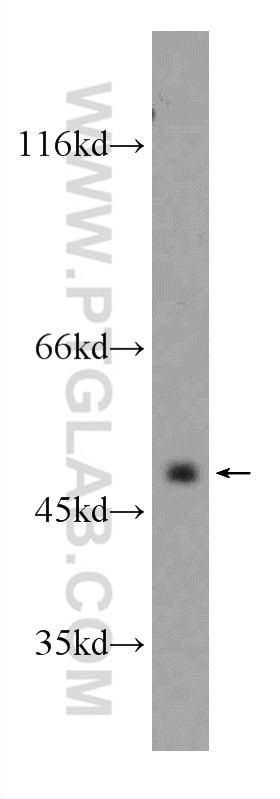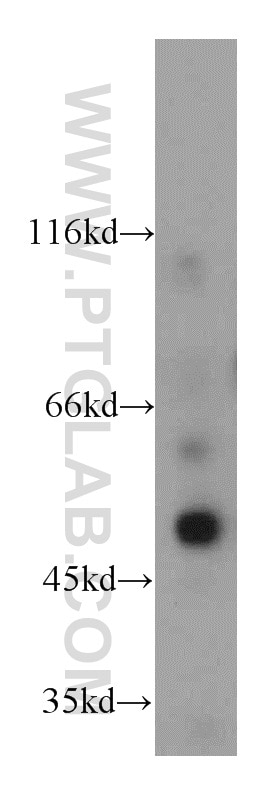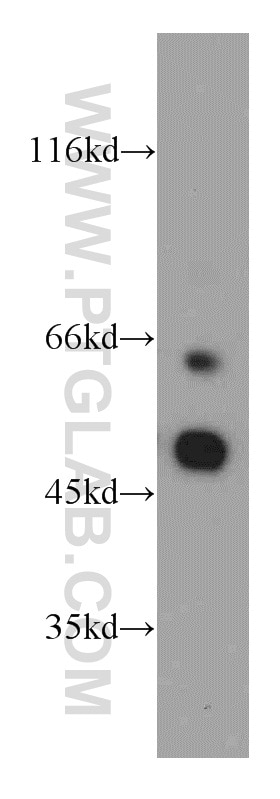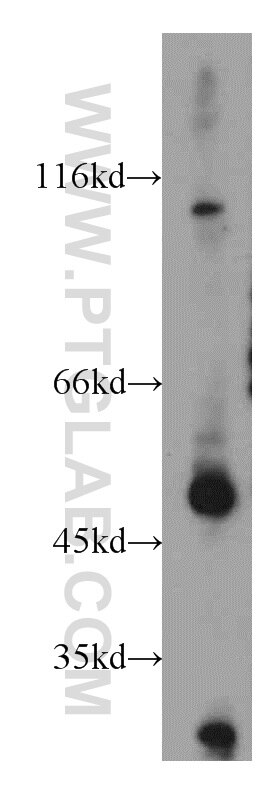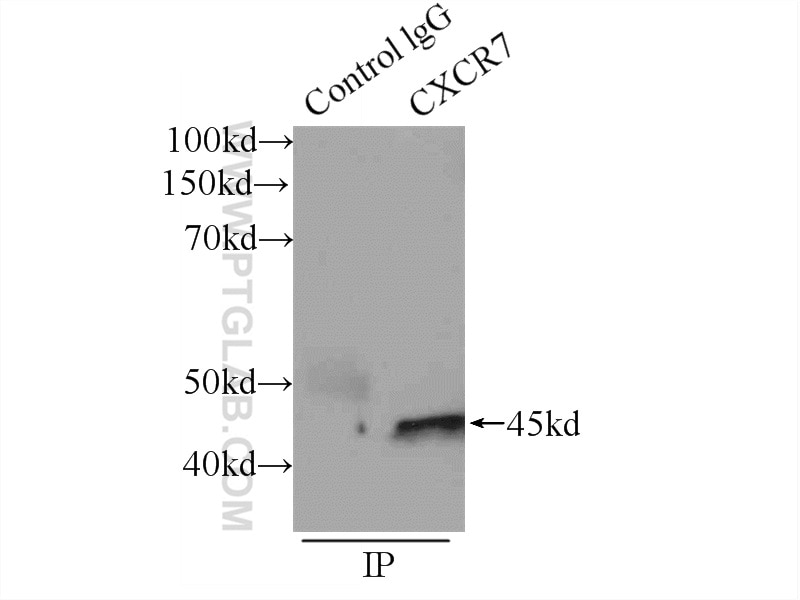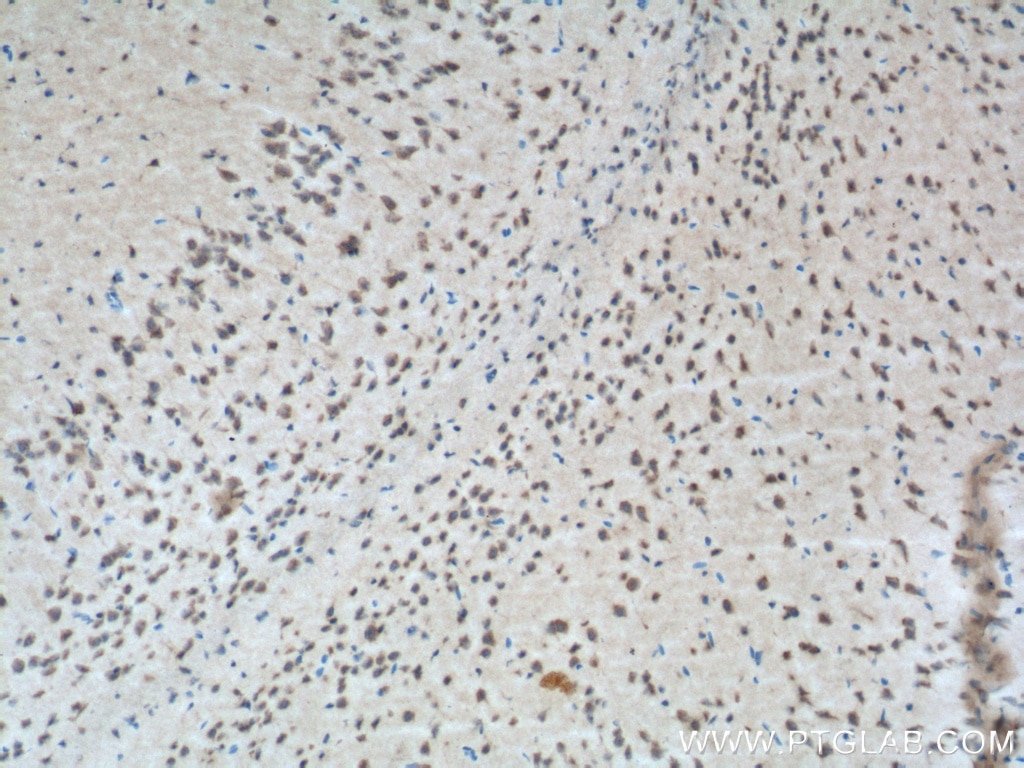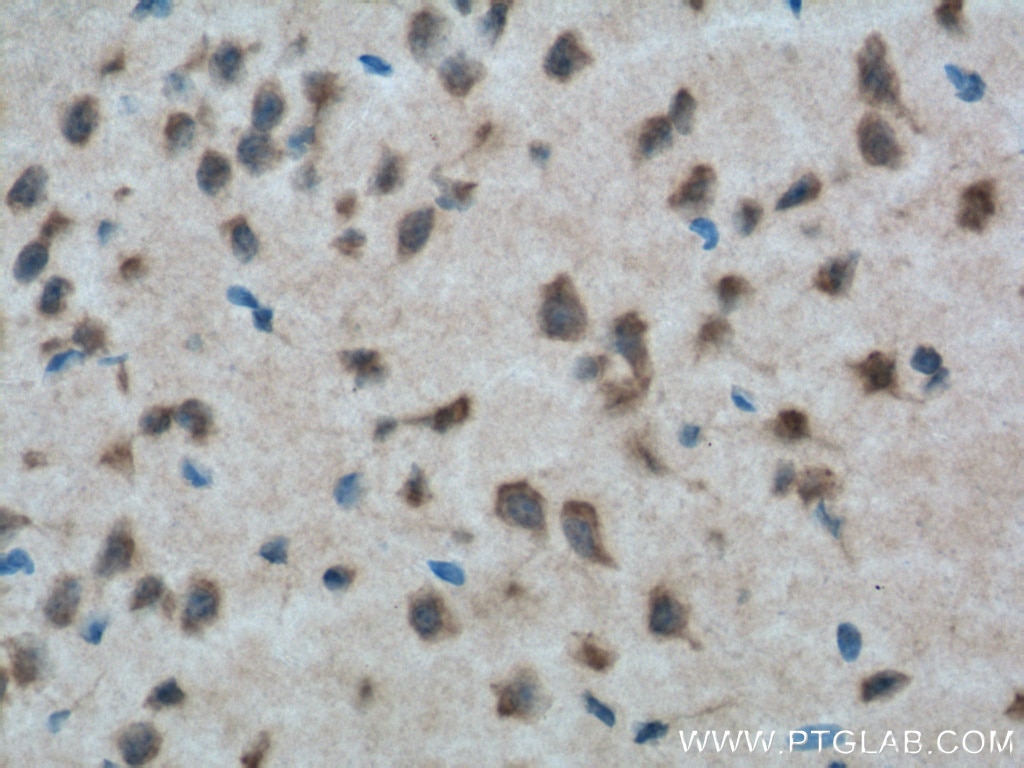- Featured Product
- KD/KO Validated
CXCR7 Polyklonaler Antikörper
CXCR7 Polyklonal Antikörper für WB, IHC, IP, ELISA
Wirt / Isotyp
Kaninchen / IgG
Getestete Reaktivität
human, Maus, Ratte
Anwendung
WB, IHC, IF, IP, ELISA
Konjugation
Unkonjugiert
Kat-Nr. : 20423-1-AP
Synonyme
Geprüfte Anwendungen
| Erfolgreiche Detektion in WB | Raji-Zellen, Jurkat-Zellen, K-562-Zellen, Maus-Thymusgewebe |
| Erfolgreiche IP | HUVEC-Zellen |
| Erfolgreiche Detektion in IHC | Maushirngewebe Hinweis: Antigendemaskierung mit TE-Puffer pH 9,0 empfohlen. (*) Wahlweise kann die Antigendemaskierung auch mit Citratpuffer pH 6,0 erfolgen. |
Empfohlene Verdünnung
| Anwendung | Verdünnung |
|---|---|
| Western Blot (WB) | WB : 1:500-1:1000 |
| Immunpräzipitation (IP) | IP : 0.5-4.0 ug for 1.0-3.0 mg of total protein lysate |
| Immunhistochemie (IHC) | IHC : 1:50-1:500 |
| It is recommended that this reagent should be titrated in each testing system to obtain optimal results. | |
| Sample-dependent, check data in validation data gallery | |
Veröffentlichte Anwendungen
| KD/KO | See 4 publications below |
| WB | See 16 publications below |
| IHC | See 8 publications below |
| IF | See 3 publications below |
Produktinformation
20423-1-AP bindet in WB, IHC, IF, IP, ELISA CXCR7 und zeigt Reaktivität mit human, Maus, Ratten
| Getestete Reaktivität | human, Maus, Ratte |
| In Publikationen genannte Reaktivität | human, Maus, Ratte |
| Wirt / Isotyp | Kaninchen / IgG |
| Klonalität | Polyklonal |
| Typ | Antikörper |
| Immunogen | CXCR7 fusion protein Ag14247 |
| Vollständiger Name | chemokine (C-X-C motif) receptor 7 |
| Berechnetes Molekulargewicht | 362 aa, 41 kDa |
| Beobachtetes Molekulargewicht | 45-50 kDa |
| GenBank-Zugangsnummer | BC036661 |
| Gene symbol | CXCR7 |
| Gene ID (NCBI) | 57007 |
| Konjugation | Unkonjugiert |
| Form | Liquid |
| Reinigungsmethode | Antigen-Affinitätsreinigung |
| Lagerungspuffer | PBS with 0.02% sodium azide and 50% glycerol |
| Lagerungsbedingungen | Bei -20°C lagern. Nach dem Versand ein Jahr lang stabil Aliquotieren ist bei -20oC Lagerung nicht notwendig. 20ul Größen enthalten 0,1% BSA. |
Hintergrundinformationen
CXCR7 (C-X-C chemokine receptor type 7), also known as RDC1, is a member of the G-protein coupled receptor family. CXCR7 can bind the chemokines CXCL11 and CXCL12 with high affinity, and it also acts as coreceptor with CXCR4 for a restricted number of HIV isolates. Expression of CXCR7 has been associated with cardiac development as well as with tumor growth and progression. This antibody recognizes endogenous CXCR7, which has an experimentally determined molecular weight of 50 kDa (PMID: 20197403; 20388803).
Protokolle
| PRODUKTSPEZIFISCHE PROTOKOLLE | |
|---|---|
| WB protocol for CXCR7 antibody 20423-1-AP | Protokoll herunterladen |
| IHC protocol for CXCR7 antibody 20423-1-AP | Protokoll herunterladenl |
| IP protocol for CXCR7 antibody 20423-1-AP | Protokoll herunterladen |
| STANDARD-PROTOKOLLE | |
|---|---|
| Klicken Sie hier, um unsere Standardprotokolle anzuzeigen |
Publikationen
| Species | Application | Title |
|---|---|---|
Ann Rheum Dis FGFR3 deficiency enhances CXCL12-dependent chemotaxis of macrophages via upregulating CXCR7 and aggravates joint destruction in mice. | ||
Biomaterials Myocardial delivery of miR30d with peptide-functionalized milk-derived extracellular vesicles for targeted treatment of hypertrophic heart failure | ||
Front Oncol Saikosaponin A Inhibits Triple-Negative Breast Cancer Growth and Metastasis Through Downregulation of CXCR4.
| ||
J Cell Mol Med Interleukin-1β augments the angiogenesis of endothelial progenitor cells in an NF-κB/CXCR7-dependent manner. | ||
Mol Cancer The chemokine receptor CXCR7 interacts with EGFR to promote breast cancer cell proliferation.
| ||
Aging Dis SDF-1/CXCR7 Chemokine Signaling is Induced in the Peri-Infarct Regions in Patients with Ischemic Stroke. |
